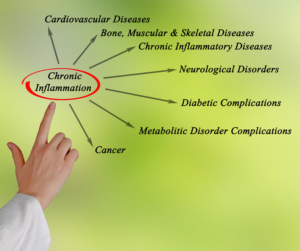Inflammation is one of the most common—and most overlooked—causes of discomfort and disease. It is your body’s natural defense mechanism, designed to protect and heal you when something goes wrong. However, when this response becomes overactive or chronic, it can quietly contribute to various issues, ranging from fatigue and joint pain to autoimmune disorders and heart disease.
Acute vs. Chronic Inflammation
There are two primary types of inflammation:
Acute Inflammation: This type occurs suddenly, such as after an injury or infection. It represents your body’s immediate response to protect and repair tissue.
Chronic Inflammation: In contrast, chronic inflammation can last for months or even years. It often arises when your immune system cannot eliminate an underlying trigger, leading to a persistent low-level “fire” in the body. Over time, this ongoing immune activity can damage healthy tissue and contribute to a wide range of health conditions.
How Chronic Inflammation Affects the Body
When inflammation becomes widespread, the immune system releases chemical messengers that travel through the bloodstream, impacting multiple systems, including nerves, organs, muscles, and joints. Many chronic inflammatory issues begin in the gut, where factors such as stress, poor diet, or food sensitivities can trigger an autoimmune response. When the gut barrier becomes compromised (a condition often referred to as "leaky gut"), inflammatory molecules can circulate throughout the body, leading to systemic inflammation.
Conditions Linked to Inflammation
Chronic inflammation is linked to numerous health issues, such as:
- Alzheimer’s disease
- Arthritis
- Asthma
- Autoimmune thyroid disorders (e.g., Hashimoto’s)
- Celiac and Crohn’s disease
- Fibromyalgia
- Heart disease and stroke
- Lupus
- Multiple sclerosis
- Neuropathy
- Psoriasis and eczema
- Rheumatoid arthritis
- Type 2 diabetes
Almost every chronic condition has an inflammatory component. 
Traditional vs. Functional Approaches to Inflammation
Conventional medicine typically addresses inflammation by suppressing the immune system with steroids or anti-inflammatory drugs. While these medications can alleviate symptoms, they do not resolve the root cause, meaning the inflammation can return once the treatment stops.
At Transform Your Health, we adopt a more functional approach, focusing on identifying and addressing the underlying factors that drive inflammation.
Common Root Causes of Chronic Inflammation
The following are some typical root causes of chronic inflammation:
- Diet: Consumption of refined sugars, alcohol, processed foods, and gluten are major inflammatory triggers, especially when done in excess.
- Medications: Long-term use of antibiotics, antacids, and corticosteroids can disrupt gut balance and immunity.
- Infections: Chronic bacterial, viral, yeast, or parasitic infections can keep the immune system in overdrive.
- Stress: Elevated levels of cortisol from prolonged stress fuel inflammatory pathways.
- Hormonal Imbalances: Shifts in thyroid, estrogen, progesterone, and testosterone can exacerbate inflammation.
- Neurological Factors: Head trauma or neuroinflammation following a stroke can trigger immune activity.
- Metabolic Disorders: Autoimmune conditions and metabolic syndrome both contribute to inflammatory cascades.
Fighting Inflammation Naturally
The most effective way to combat inflammation is through nutrition and lifestyle changes. Start by eliminating inflammatory foods and focusing on nutrient-rich, whole foods that promote healing—think vegetables, healthy fats, lean proteins, and omega-3-rich foods.
Other effective strategies to reduce inflammation include:
- Managing stress through mindfulness, yoga, or breathwork
- Prioritizing sleep and recovery
- Staying active with gentle, consistent movement
- Supporting gut health with probiotics and digestive aids
When inflammation is reduced, pain decreases, energy levels improve, and the body can begin to heal naturally. Many patients notice enhancements in fatigue, hormone balance, joint pain, digestion, and immune function once inflammation is under control.
Advanced Support: Nutrient Therapy and IV Infusions
For individuals dealing with long-standing inflammation or nutrient deficiencies, IV infusion therapy and targeted nutraceutical support can provide a quicker recovery path. These therapies deliver anti-inflammatory vitamins, antioxidants, and amino acids directly into the bloodstream for optimal absorption and cellular repair.
The Takeaway
Inflammation serves as both a warning signal and an opportunity—your body’s way of indicating that something is out of balance. By identifying and addressing the actual root causes, you can extinguish that internal fire and restore lasting wellness.
If you’re experiencing chronic pain, fatigue, or an inflammatory condition, contact our team at Transform Your Health to see what we can do to help uncover the triggers and guide you toward a personalized plan for healing.



